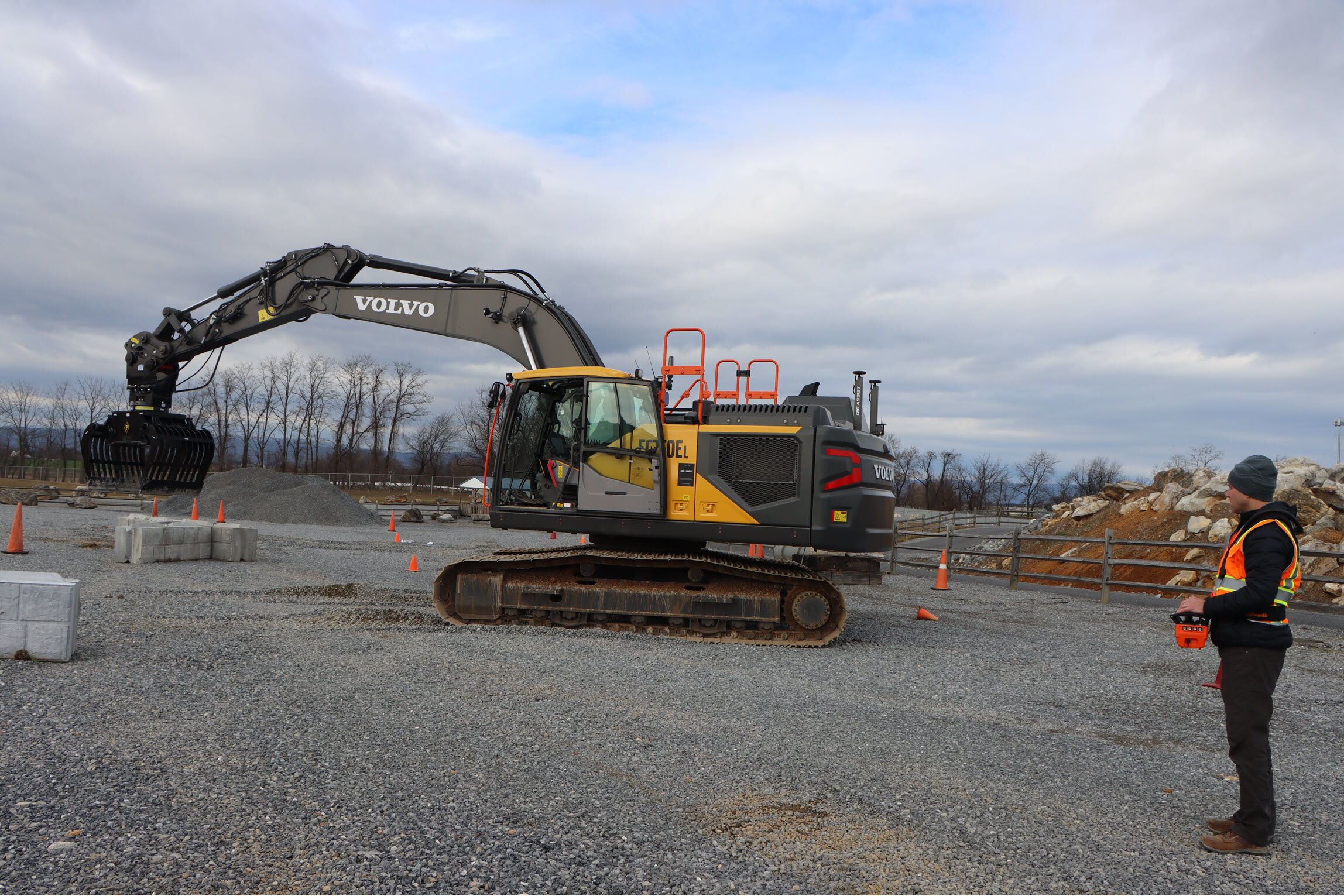Comprehending Just How Excavator Functions and Its Impact on Efficiency
Excavators play a crucial role in building and mining operations, counting on a complex interaction of hydraulic and mechanical systems. Their ability to carry out a range of jobs depends upon both their style and the modern technology incorporated within. Comprehending these parts can significantly influence functional performance and performance. As developments remain to reshape the sector, one need to think about how these changes will certainly influence future techniques and performance.
The Essentials of Excavator Mechanics

The Duty of Hydraulic Equipments in Excavators
At the heart of excavator operation exists the hydraulic system, which plays a critical duty in powering the maker's movements and functions. This system makes use of pressurized hydraulic fluid to transfer power, allowing numerous actions such as lifting, swinging, and excavating. By using the concepts of hydraulics, excavators can carry out tasks with amazing accuracy and pressure, enhancing general operational efficiency.The hydraulic system contains essential components, consisting of cyndrical tubes, valves, and pumps, which work with each other to regulate the flow and instructions of the liquid. When the driver involves the controls, the hydraulic fluid is routed to specific cyndrical tubes, converting the driver's commands right into physical motion. This mechanism allows for smooth and responsive actions, which are crucial in construction and excavation atmospheres. double e volvo rc excavator. The performance of the hydraulic system straight influences the efficiency and versatility of the excavator, making it a vital component in modern-day excavation processes
Trick Elements of an Excavator
Understanding the crucial parts of an excavator is vital for grasping just how this powerful machine operates. An excavator contains several substantial components, consisting of the undercarriage, home, boom, pail, and arm. The undercarriage provides security and movement, frequently including wheels or tracks to browse various terrains. Your home consists of the engine and hydraulic systems, allowing the driver to regulate movement and power the machine. The boom prolongs from the house, enabling vertical reach, while the arm attaches to the bucket, helping with excavating and training operations.Additionally, the taxi houses the operator, furnished with controls for specific handling. Each of these parts plays an important function in the excavator's total functionality, adding to its performance and performance on building and construction sites. Understanding these components assists in maintaining and maximizing excavator efficiency, ensuring tasks are completed securely and effectively.
Add-on Convenience and Its Benefits
Add-on adaptability is an important element of excavators, making it possible for drivers to change between different devices tailored for certain jobs. This versatility not just enhances task effectiveness but additionally adds to cost-effectiveness by minimizing the requirement for several machines. Comprehending the various kinds of add-ons available can considerably impact the total efficiency and performance of an excavator on task websites.
Types of Add-ons
While excavators are largely recognized for their excavating capacities, their true convenience depends on the wide selection of add-ons available. These attachments enhance the excavator's performance, allowing it to carry out various tasks beyond excavation. Common add-ons include pails (for digging and scooping), hydraulic thumbs (for realizing products), and augers (for drilling openings) Grapples are used for managing and relocating debris, while rippers can separate difficult surfaces. Various other specialized attachments, such as plates and plows, allow excavators to adapt to certain task needs. This diversity not only increases the equipment's energy across different fields, consisting of landscaping, demolition, and construction, but additionally enables drivers to customize their equipment to meet particular job demands efficiently.
Boosted Job Efficiency
Optimizing job efficiency is a main advantage of using different excavator add-ons. Different attachments enable an excavator to execute several jobs without needing to change devices, conserving beneficial time and labor. As an example, using a hydraulic hammer can break concrete while a pail accessory can excavate dirt, enabling a smooth operations. This adaptability lowers downtime connected with devices adjustments and enhances performance on-site. In addition, specialized attachments improve precision in jobs such as grading or landscaping, resulting in better outcomes. The capacity to adapt to various work requirements not only improves operations yet likewise minimizes the need for added equipment, guaranteeing that tasks are finished quickly and effectively. On the whole, accessory adaptability substantially adds to boosted task efficiency in excavation work.
Cost-Effectiveness and Flexibility
Cost-effectiveness is a considerable benefit of making use of functional excavator add-ons. These accessories allow a solitary excavator to do numerous jobs, lowering the requirement for added machinery and labor - double e volvo rc excavator. By switching over between containers, hammers, and grapples, drivers can take on numerous projects, from excavating to demolition, consequently taking full advantage of devices utilization. This flexibility not just reduces operational costs yet additionally reduces downtime related to transforming tools. Additionally, the capacity to personalize excavators with specialized accessories improves productivity, as they can successfully take care of diverse jobs according to project demands. To end, the mix of cost-effectiveness and adaptability in excavator attachments adds to improved operational effectiveness and source allotment in building and construction and excavation tasks

Advanced Technology in Modern Excavators
Modern excavators are increasingly outfitted with sophisticated innovation that transforms excavation processes. Automation streamlines procedures, while boosted gas effectiveness reduces functional prices. Additionally, clever control systems enhance accuracy and safety, marking a considerable advancement in excavation equipment.
Automation in Excavation Processes
As excavation innovation advances, automation has emerged as an important part in enhancing efficiency and precision on task sites. Modern excavators are furnished with advanced automated systems that facilitate tasks such as grading, excavating, and trenching with very little operator intervention. These systems use sensors, GPS, and equipment understanding formulas to guarantee accurate positioning and deepness control, greatly decreasing the margin for error. Furthermore, automation enables drivers to concentrate on critical decision-making as opposed to manual controls, resulting in boosted productivity in general. Such advancements not only simplify operations yet likewise enhance security by reducing human error in complex procedures. As a result, the combination of automation in excavation procedures stands for a significant improvement in building modern technology, driving the industry towards greater performance and effectiveness.
Improved Fuel Effectiveness
Advancements in technology have actually additionally caused substantial renovations in fuel effectiveness for modern excavators. Modern machines are geared up with sophisticated engines that maximize power outcome while reducing gas intake. These engines use cutting-edge burning innovations, such as turbocharging and straight gas shot, to boost performance and effectiveness. In addition, lightweight materials in building reduce general weight, permitting for less power expenditure during operation. The intro of variable speed controls allows drivers to adjust engine efficiency according to particular jobs, further decreasing fuel usage. As an outcome, these enhancements not only reduced functional costs however additionally add to ecological sustainability by lowering emissions. On the whole, boosted gas efficiency in excavators is an essential advancement that boosts performance and economic feasibility in the building and construction industry.
Smart Control Solution
While operators navigate progressively complex work websites, clever control systems in excavators have actually become necessary tools for enhancing performance and precision. These sophisticated technologies utilize algorithms and sensors to check different specifications such as lots weight, terrain problems, and operational efficiency. By instantly adjusting hydraulic functions, wise systems maximize machine performance, causing enhanced performance and lowered endure elements. Additionally, drivers benefit from intuitive interfaces that supply real-time responses and diagnostics, enabling informed decision-making. This integration of modern technology not only enhances procedures yet additionally reduces human mistake, adding to why not check here more secure work environments. As the construction industry proceeds to develop, wise control systems will play an important duty in forming the future of excavator effectiveness and performance.
Enhancing Operational Performance With Excavators
Excavators play an important function in boosting functional performance across numerous building and excavation projects. Their flexibility enables numerous tasks, consisting of material, training, and digging handling, which improves operations and minimizes the need for added tools. With effective hydraulic systems, excavators can carry out durable tasks with accuracy, considerably decreasing the time required to total projects. The combination of advanced innovation, such as general practitioner and automated controls, even more enhances their procedure, making it possible for drivers to achieve greater accuracy and decrease material waste. In addition, contemporary excavators are developed to eat less fuel and lessen discharges, contributing to both cost savings and ecological sustainability. By making use of excavators efficiently, building and construction teams can enhance performance, satisfy task target dates, and improve overall website management. This multifunctionality and performance make excavators crucial tools in the modern construction landscape.
The Future of Excavators in Building and Mining Industries
As the building and construction and mining markets develop, the future of excavators is poised for substantial change driven by technical innovation and transforming operational needs. Breakthroughs in automation and expert system are improving excavator more information abilities, permitting boosted accuracy and performance in operations. Self-governing excavators are emerging, lowering the demand for human treatment and reducing the threat of accidents.Moreover, the integration of telematics and IoT technology allows real-time surveillance of equipment performance and predictive upkeep, maximizing uptime. Environment-friendly layouts, including hybrid and electric versions, are getting traction, lining up with sustainability goals within the industry.Additionally, using innovative materials and lighter styles boosts gas effectiveness while maintaining efficiency standards. As these fads progression, excavators will play an essential role in satisfying the enhancing demands for productivity and security in construction and mining, ultimately changing functional landscapes.
Often Asked Concerns
Just How Do Climate Condition Impact Excavator Efficiency?

Climate conditions considerably influence excavator efficiency, as rain and mud can impede grip and security, while extreme temperature levels may influence hydraulic systems. Operators has to adapt to these variables to ensure perfect capability and security during procedures.
What Security Measures Should Operators Follow While Making Use Of Excavators?
Precaution for excavator drivers include wearing proper individual protective equipment, carrying advice out pre-operation assessments, making certain appropriate interaction with ground workers, keeping a risk-free range from above risks, and sticking to recognized operational procedures to avoid accidents.
Exactly How Usually Should Excavators Be Preserved for Optimum Efficiency?
Excavators should be preserved routinely to guarantee peak efficiency, usually every 250 operating hours or as defined by the maker. Routine checks improve reliability, stop unanticipated breakdowns, and prolong the lifespan of the equipment.
What Is the Average Life Expectancy of an Excavator?
The ordinary life-span of an excavator usually ranges from 10,000 to 15,000 hours of operation. Variables affecting long life include maintenance methods, operating conditions, and the top quality of the device itself, impacting total efficiency and effectiveness.

Can Excavators Operate Irregular Surface Properly?
Excavators can run efficiently on irregular surface due to their expressed designs and adjustable tracks. These features allow them to keep security and grip, allowing effective operation in tough settings typically encountered in building and landscaping projects. Each of these elements plays an important role in the excavator's total functionality, contributing to its efficiency and effectiveness on building and construction websites. Optimizing work performance is a primary benefit of using different excavator accessories. While operators browse progressively complex task sites, smart control systems in excavators have emerged as crucial tools for enhancing efficiency and accuracy. Excavators play a necessary duty in enhancing functional effectiveness throughout numerous building and construction and excavation tasks. Advances in automation and synthetic knowledge are reshaping excavator capacities, enabling for boosted accuracy and effectiveness in procedures.
Comments on “The Top Benefits of Using a remote control excavator in Demolition Tasks”